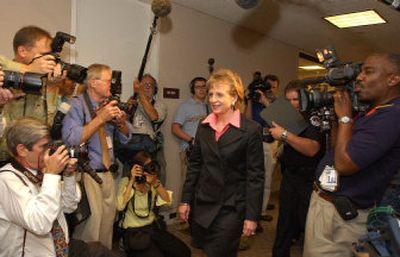Conservatives are dismayed as potential justices ignored

WASHINGTON – If there has been a unifying cause in American conservatism over the past three decades, it has been a passionate desire to change the Supreme Court. When there were arguments over tax cuts and deficits, when libertarians clashed with religious conservatives, when disputes over foreign policy erupted, reshaping the judiciary bound the movement together.
Until Monday, that is. Now conservatives are in a roiling fight with the White House over President Bush’s nomination of White House counsel Harriet Miers to the high court. They fear the president may have jeopardized their dream of fundamentally shifting the court by nominating someone with no known experience in constitutional issues rather than any one of a number of better-known jurists with unquestioned records.
The dismay among conservatives stems partly from the fact that so little is known about Miers, a well-regarded corporate lawyer, member of the Texas legal establishment, evangelical Christian and confidante of the president. But in a deeper way it reflects the smoldering resentment about other administration policies – from big-spending domestic programs to fragmentation over Iraq – and enormous frustration that a president who prides himself on governing in primary colors has adopted a stealth strategy on something as fundamental to conservatives as the Supreme Court.
“No one has anything against her,” said William Kristol, editor of the Weekly Standard and one of the first conservatives to register his disappointment. “But the idea that one is supposed to sacrifice both intellectual distinction and philosophical clarity at the same time is just ridiculous.”
For more than two decades, conservatives have been developing a team of potential justices for the high court in preparation for a moment like this. They point to jurists such as Judge J. Michael Luttig of the U.S. Court of Appeals for the 4th Circuit, Judge Michael McConnell of the 10th Circuit or Judge Priscilla Owen, newly sworn in on the 5th Circuit, as examples of people who have not just paid their dues but also weathered intellectual battles in preparation for reshaping the Supreme Court.
The reaction to Miers has been in sharp contrast to the reception afforded new Chief Justice John G. Roberts Jr. when he was nominated. While Roberts did not come to the battle with a reputation as one of the activists in the conservative legal movement, conservatives were reassured by his experience in the Reagan and first Bush administrations and dazzled by his brainpower.
Bush’s failure to look to conservatives on the appellate courts to replace Justice Sandra Day O’Connor proved to be a massive case of dashed expectations. “The feeling was after John Roberts that surely the president was going to have to go to the bench where there were all these very excellent people who are serving on the circuit court or scholars who have been grooming for this possibility for years and years,” said Paul Weyrich, a leading voice in the conservative movement and one who has been openly skeptical of Miers.
The conservative project to reshape the judiciary long predates this presidency. This only heightened the surprise and resentment that the president has asked all those who have been in the vanguard of that movement to sublimate their feelings and now march in lockstep behind someone on his word alone, no matter how well he says he knows her.
“With so much at stake, to many of us it seems ill-advised to nominate somebody that we’re then told we should have faith in, when there isn’t any evidence of intellectual rigor being applied to these contentious issues,” said conservative activist Gary Bauer.